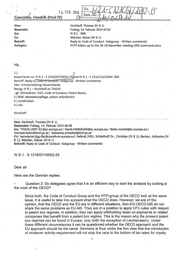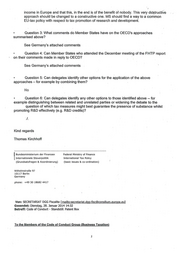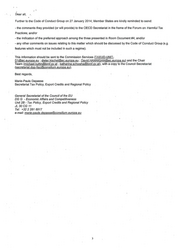coc-3
Dieses Dokument ist Teil der Anfrage „IFG: EU-Gruppe zu Code of Conduct (Business Taxation)“
. ,, =~=e~=·za=~lt=a,= = He=nd=rri;;;;::::i h: (i=::: 3 ======· · Po=oi=XV) =: =S~=P,=Z0=~: : :!:"' :=~~=~=.~=11),~~~~=~~~ 13 Vo n: Wächter, Rainer (IV B 1) Gesendet : Montag, 23. September 2013 15:27 An: IV B 1- BSB Ce: Kirchhoff, Thomas (IV B 1); Becker, Katharina (IV B 1) Betreff: WG: German Comments on room document # 3 - Code of Conduct Business Taxation Anlag en: Code of Conduct_inbound-CFC_switch_over_ 2013_09_23_ German Comments.docx Vfg. 1.) e-mail importieren zu : IV B 1 - S 1316/07/10052-49; n IV B 1- S 1316/07/10052-50 Sitzung 22. Oktober 2013); neu IV B 1- S 1316/12/10044 :007 (lnbound Profits.- CFfcc::"juiJinifr<w:iri711TRim---_l lier: · Bezug: Ggf. Stichwörter: 2.) BSB: Metadatenpflege, sofern erforderlich 3.) Ausdrucken - 4.) zSa Wächter Von: Wächter, Rainer (IV B 1) Gesendet : Montag, 23. September 2013 15:22 An : 'SECRETARIAT DGG Fiscalite' Ce: 'marie-paule.depasse@consilium.europa.eu'; Becker, Katharina (IV B 1); Schleithoff Dr., Christian (IV B 1); irchhoff, Themas (IV B 1) · Betreff: German Comments on room document # 3 - Code of Conduct Business Taxation Oear Marie-Paule, please find attached the German comments on room document #3 . Best regards Rainer Wächter V«»n : SECRETARIAT DGG Fiscalite [mailto:secretariat.dgg-fisc@consilium.europa.eu] Gesendet!:: Donnerstag, 19. September 2013 16:31 Betreff: Code of Conduct - Written comments/comments on room document # 3 To t he Members of the Code of Conduct Group (Business Talt:ation)

Dear all, Following the Code of Conduct meeting on 11 September 2Ö13, delegations are kindly invited tosend written answers or comments on room document # 3 (Workpackage 2011 - Monitaring guidance on inbound profits) by 1st October 2013, cob. Best regards, Marie-Paule Depasse Secretariat Tax Policy, Export Credits and Regional Policy General Secretariat of the Council of the EU DG G - Economic Affairs and Competitiveness Unit 28 - Tax Po/icy, Export Credits and Regional Policy JL 30 CG 11 Tel: +32 2 281 6917 e-mail: 2

German Comments Code ofConduct Group- Workp~ckage 201 1- Monitoring Guidance on lnbound Profits Room Document # 3, meeting of 1 I September 2013 Germany thanks the Commission for the useful summary of the work being done so far on inbound profits. The paper and the tables provide a good overview on the problems that we are facing when trying to evaluate the measures being taken by Member States to ensure that profits entering the EU are being taxed once. . Considering the questions raised in the paper on Minimum Standards-and the Toolbox, we have .come to the conclusion, that there is a de:finite·need for minimum standards (as laid down in column A), combined with possible approaches (as· suggested in column B). A. CFC-rules CFC rules origin from the strict division between the taxation of corporations and their shareholders (recognition of deferraD on the one side and the cross-border differentials of tax rates on the other side. There seems tobe broad international acceptance on the recognition of deferral for ii:rvestments in jurisdictions with lower tax rates provided the investment directly relates to active business. Conversley, passive investments in low tax jurisdictions are often · purely taxdriven and thus erode in an unaceceptable way the tax base ofthe investor's country. This is why an increasing number of countries have introduced CFC rules, which re- attribute foreign passive income (tainted income) to the domestic investor. The complexity of the tax considerations has, in ordertobe effective, cornplex CFC-rules. In our view, effective CFC-rules have to fulfill the following minimum standards: 1. Definition of a CFC 2. Definition ofthe persons on whom CFC taxwill be charged (control) 3. Definition ofpassive income, i.e. the income that is subject to CFC legislation (income other than active business income) 4. Principles for the calculation ofthe pas·sive income 5. Application to territories with a lower Ievel oftax (minimurn tax rate); 6. Limited territorial exclusions. With respect to these minimurn standaids, different tools may Iead to efficient rules~ Wehave the following comments on the suggested tools: 1. Definition of a CFC (control)

- 2- We think that there is no use in choosing a company not resident in the MS, ifthere is no cmmection to or control ofthe investor in the MS. We thus recommend striking a. In addition we are of the firm view that ihdirect control has to be considered in order to prevent easy circumvention of the application of CFC rules. Thus, c and d should be extended to include indirect contro1. We also recommend taking the options into consideration, which the council WP 4 has considered in connection w:ith the CCCTB work: The taxpayer by itself, or Iogether with its associated enterprises, holds a direct or indirect parlicipalion ofmore than 50% ofthe voling rights, or owns more thcm 50% of capital or is entitled to receive more than 50% ofthe projits ofthat entity, or holds because ofan agreement with other invest01;s more than 50% ofthe voting rights, or has becaus·e ofan agreement the Juli control over the financial and operating policies ofthe entity, or has the authority to appoint or dismiss members ofthe board of directors, or power to cast more than 50 % of the votes in the board of directors. 2. Defini~ion of ~he persons on whom CIFC tax will be charged We do not think that the two mentioned alternatives Iead to the right result. Both ofthem can easily be circtimvented to avoid CFC-charge. In our view, the definition should comprise a resident taxpayer, which is either a company or an individual, who controls a foreign subsidiary under the conditions mentioned ip I. 3. Principles for tbe calculation of ~he income to be attrübuted to the taxpayer All methods mentioned are basically acceptable. 4. Ddinntion of active or passive income of tRte CFC To achieve effective CFC rules, we think that the income tobe attributed to the controlling taxpayer should be thoroughly designed. It is possible to do it both in a positive or negative way. Without a certain common view on this income, there is no protection ofbase erosion. 5. Applicatiol!1 to terll"itornes with a !owell" !evel oftax (mimimum tax Jra~e) The suggestions are basically acceptable. However we think that we need a certain minimuin tax rate. Otherwise we risk circumventions via the MS with the lowest rate and there is no . 6. Limited ten~tornal excßusions

-3- A broad territorial exclusion would make the CFC rule ineffective. There are certainly reasons for such exclusions, i.e. in cases of overlap with DTA switch over rules. Otherwise we do not see any reason for exclusions with the exception ofthe EEA!EU exclusion for cases which are not artificial arrangements. Germany is, by the way, ofthe view that this EEAIEU exclusion should be revisited. Given the BEPS project, we think that there is a need to review the current status as it emerged frorn the Cadbury-Schweppes decision ofthe ECJ. A fundamental question to be raised in connection with BEPS is the question of economic a ctivity. This has to be discussed in the Code of Conduct group, too. B. Switch over rules Generally, we think that switch over rules arenot as effective as CFC rules. The reason isthat foreign passive income might not be distributed at all and countfies thus do not have the possibility to retrieve that incorne. On the other band, switch over rules do not have to be devised as complicated at CFC-rules. With respect to table A we think th~t number I and 3 are necessary mandatory preconditions for switcb over rules. On 1, again, we think that, as a planned European rule, we need an agreement on a minirnum tax. This would also be in line with the generat principle that the delimitation oftaxing rights should not result in (double) non-taxation, but also ensure effective single taxation. Otherwise there is the risk of circumvention via the MS with the lowest taxrate condition. This would not be in the interest of an econornically sound and reasonable allocation of resources within the EU. On 3, we are ofthe view that both tools should be mandatory. Both are necessary to avoid circumventions. On territorial exclusions, see our corrunents on A.6.

' ·-

f • 'I f.. -~ 1 4. FEB. Z01~ r-G_r_.~r.&-+~ -1--t'f-+-.:.=J.-bl/-~b/....J.)L -J ff Cze<eZC!Jfdia, Hendlrik (Pooll!V) (tc,; Von: Kirchhoff, Thomas (IV B 1) Gesendet: Freitag, 14. Februar 2014 07:02 An: IV B 1- BSB Ce: Wächter, Rainer (IV B 1) Betreff: Reply to Code of Conduct -Subgroup - Written commentsl Anlagen: FHTP follow-up to the 16-18 December meeting GER comments.docx Vfg. 1.) Importieren zu : IV B 1-5 1316/07/10052-55 und IV B 1- S 1316/12/10044 :006 Betreff: Reply to o e c - u group - Wrjtten comments Hier: Antwortbeitrag Deutschlands ßezug: IV B 1- Kirchhoffan TAXUD jgf. Stichwörter: COC; Code of Conduct, Patent Boxes; 2.) BSB: Metadatenpflege, sofern erforderlich 3.) Ausdrucken 4.} zSa Kirchhoff Von : Kirchhoff, Thomas {IV B 1) Gesendet: Freitag, 14. Februar 2014 06:58 An: 'TAXUD-UNIT-D 1@ec.europa .eu'; David. HANNIGAN@ec.europa .eu; 'dieter. kischel@ec.europa .eu'; 'michael.kuttin@bmf.gv.at'; 'katharina.schwaha@bmf.gv.at' C«:: 'secretariat.dgg-fisc@consilium.europa.eu'; Referat IVB1; Schleithoff. Dr., Christian {IV B 1); Becker, Katharina (IV B 1); Wächter, Rainer {IV B 1) Betreff: Reply to Code of Conduct -Subgroup - Written commentsl IV B 1 - S 1316/07/10052-55 Dear all Here are the German replies: o Question 2: Do delegates agree that it is an efficient way to start the analysis by looking at the work of the OECD? Since both, the Code of Conduct Group and the HTP-group of the OECD Iook at the same issue, it is useful to take into account what the OECD does. However, we are of the opinion, that the OECD and the EU are in different situations. Non-EU-OECD-MS do not share the same ·problems as EU-MS. They are in a position to apply CFC-rules with respect to patent box regimes, in addition, they can apply withholding taxes on payments to related companies that benefit from a patent box regime. This is the reason why the present patent box regimes can be found in Europe, only (with the exception of Liechtenstein). Und er thesedifferent circumstances it can be questioned.whether the OECD approach and the EU approach should be the same. Germany is thus under the firm view that the introduction of whatever activity-requirement will not stop the. race to the bottarn of tax rates for royalty .•

I I • • • t income in Europe and that this, in the end is. of the benefit of nobody. This very döstructive approach should be changed to a constructive one. MS should find a way to a common EU-tax policy with respect to tax promotion of research and development. o Question 3: What comments do Member States have on the OECD's approaches summarised above? See Germany's attached comments o Question 4: Can Member States who attended the December meeting of the FHTP report on their comments made in reply to OECD? See Germany's attached comments . o Question 5: Can delegates identify other options for the application of the above approaches - for example by combining them? 1\!o o Question 6: Can delegates identify any other options to those identified above ~ for example distinguishing between related and unrelated parties or widening the debate to the question of which tax measures might best guarantee the presence of substance whilst promoting R&D effectively (e.g. R&D credits)? .1. Kind regards Thomas Kirchhoff Bundesministerium der Finanzen Federal Ministry of Finance j Internationale Steuerpolitik International Tax Policy (Grundsatzfragen & Koordinierung) (basic issues & Co-ordination) Wilhelmstraße 97 10117 Berlin Germany phone : +49 3018682 4417 Von: SECRETARIAT DGG Fiscalite [mailto:secretariat.dgq-fisc@consilium.europa.eu] Gesendet: Dienstag, 28. Januar 2014 14:32 Bet reff: Code of Conduct - Standstill: Patent Box To the Members of the Code of Conduct Group (Business Talcation) 2
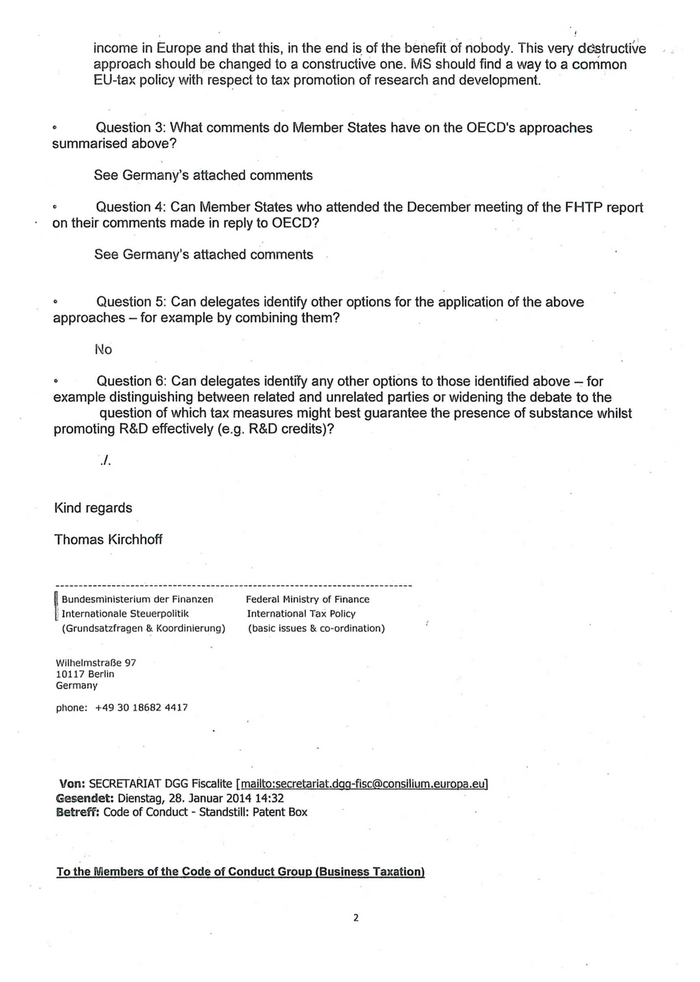
I ' -\- . \· Dear all, '. Further to the Code of Conduct Group on 27 January 2014, Member States are kindly reminded. tosend: - the comments they provided (or will provide) to the OECD Secretariat in the frame of the Forum on Harmful Tax Practices; and/or - the indication of the preferred approach among the three presented in Room Document #4; and/or - any other comments on issues relating to this matter which should be discussed by the Code of Conduct Group (e.g. features which must not be included in such a regime) . This information should be sent to the Garnmission Services Q-AXUD-UNIT- D1@ec.europa.eu; dieter.kischel@ec.europa.eu; David.HANNIGAN@ec.europa.eu) and the Chair Team (michael.kuttin@bmf.gv.at ; katharina.schwaha@bmf.gv.at), with a copy to the Council Secretariat (secretariat.dgg-fisc@consilium.europa .eu). · · Best regards, Marie-Paule Depasse Secretariat Tax Policy, Export Credits and Regional Policy General Secretariat of the Council of the EU DG G - Economic Affairs and Competitiveness Unit 28- Tax Policy, Export Credits and Regional Policy JL 30 CG 11 Tel: +32 2 281 6917 e-mail: marie-paule. depasse@consilium.europa. eu 3
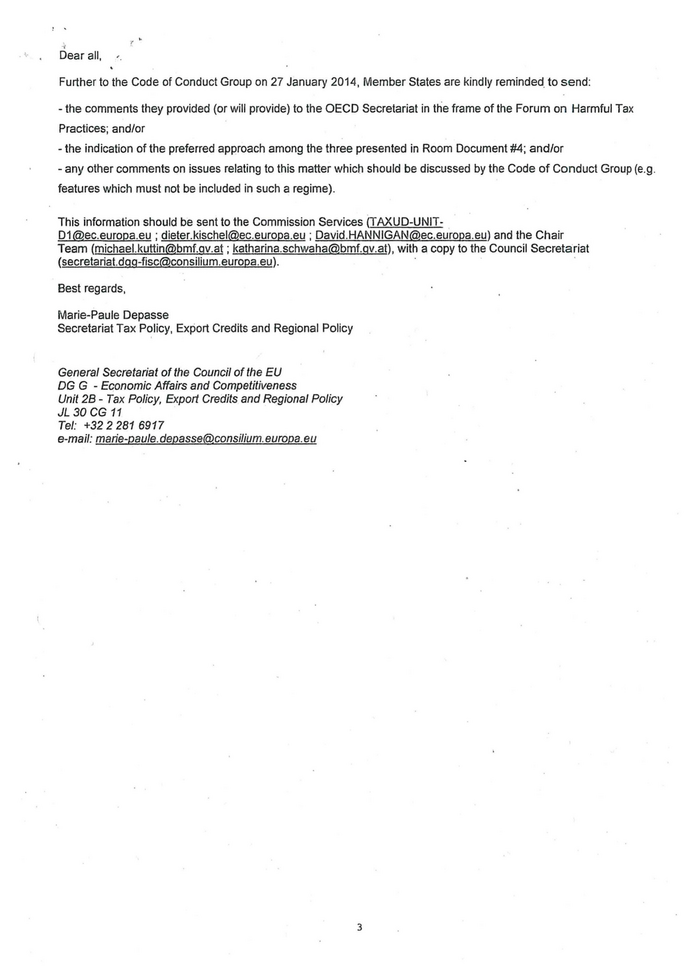
,.,







